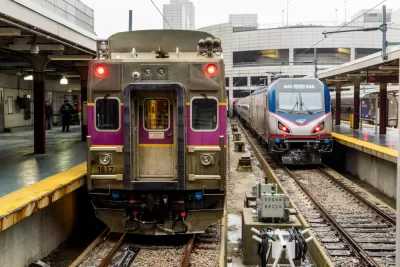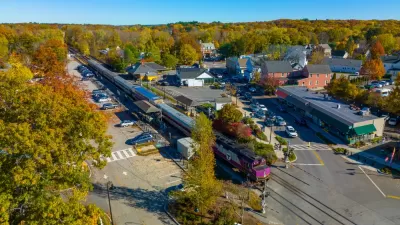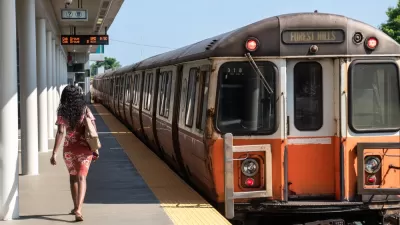Cities with commuter rail stops will have to accommodate higher-density housing or risk losing access to state resources and housing grants.

Massachusetts' latest economic development bill includes a rule that requires municipalities served by Massachusetts Bay Transportation Authority (MBTA) commuter trains to permit denser housing in at least one district within a half mile of a station. The measure is meant to create more housing near transit stations and alleviate greater Boston's growing housing crisis, according to an article Tim Logan. "The biggest barrier to building in Massachusetts is zoning and the lack of zoning for multifamily housing. People want walkable neighborhoods, and this will help us produce them," said Rachel Heller, CEO of the advocacy group Citizens Housing and Planning Association, in the article.
Some cities along the MBTA's rail lines with little or no land zoned for higher density protested the measure, insisting that local zoning decisions should stay in local hands. "Mandates from Beacon Hill are no way to build," said Massachusetts Municipal Association executive director Geoff Beckwith, adding: "New laws won’t work if they strip average citizens of their role and voice." State Senator Joe Boncore argues that the rule is a fair trade for access to state infrastructure and grants: "Suburban towns benefit from being on the regional transportation network, he said, so they should contribute to tackling the regional housing shortage."
The new rule is part of a package that includes "Housing Choice," another proposal aimed at reducing barriers to building denser housing by reducing the percent of votes needed to pass zoning changes.
FULL STORY: New law would require high density housing near T stations

Planetizen Federal Action Tracker
A weekly monitor of how Trump’s orders and actions are impacting planners and planning in America.

Congressman Proposes Bill to Rename DC Metro “Trump Train”
The Make Autorail Great Again Act would withhold federal funding to the system until the Washington Metropolitan Area Transit Authority (WMATA), rebrands as the Washington Metropolitan Authority for Greater Access (WMAGA).

DARTSpace Platform Streamlines Dallas TOD Application Process
The Dallas transit agency hopes a shorter permitting timeline will boost transit-oriented development around rail stations.

Renters Now Outnumber Homeowners in Over 200 US Suburbs
High housing costs in city centers and the new-found flexibility offered by remote work are pushing more renters to suburban areas.

The Tiny, Adorable $7,000 Car Turning Japan Onto EVs
The single seat Mibot charges from a regular plug as quickly as an iPad, and is about half the price of an average EV.

Supreme Court Ruling in Pipeline Case Guts Federal Environmental Law
The decision limits the scope of a federal law that mandates extensive environmental impact reviews of energy, infrastructure, and transportation projects.
Urban Design for Planners 1: Software Tools
This six-course series explores essential urban design concepts using open source software and equips planners with the tools they need to participate fully in the urban design process.
Planning for Universal Design
Learn the tools for implementing Universal Design in planning regulations.
Municipality of Princeton
Roanoke Valley-Alleghany Regional Commission
City of Mt Shasta
City of Camden Redevelopment Agency
City of Astoria
Transportation Research & Education Center (TREC) at Portland State University
US High Speed Rail Association
City of Camden Redevelopment Agency
Municipality of Princeton (NJ)





























